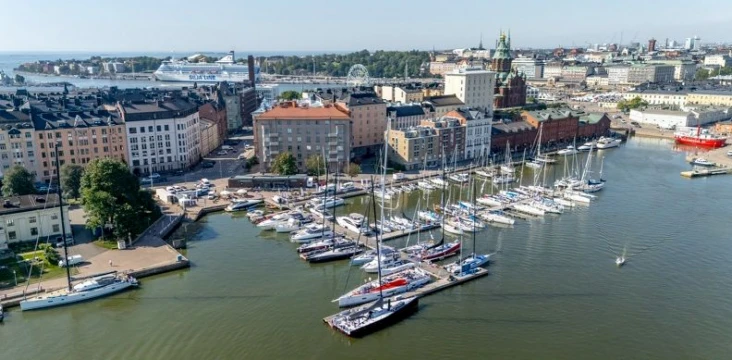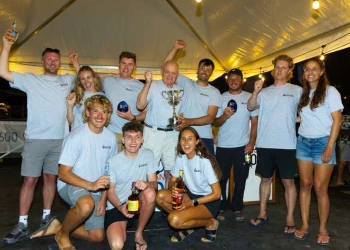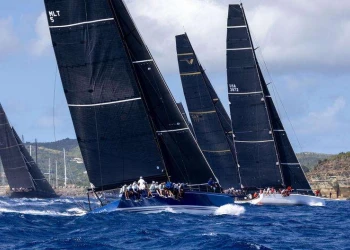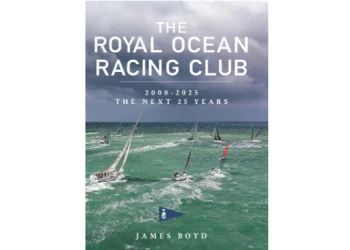
Crews on the 40-strong fleet are making final preparations at MarinaBay in the heart of Helsinki © Pepe Korteniemi /[email protected]
The 2024 Roschier Baltic Sea Race will start on Saturday 27th July 2024
Just two days before the start of the Roschier Baltic Sea Race weather forecasters are predicting record breaking conditions with big breeze arriving during the 635-mile race. Potentially three days into the race the fleet could see 30 knots of gradient breeze from the north or north west, with more in the gusts. The scratch boat in this second edition is Christian Zugel’s Volvo 70 Tschüss 2 (USA). Weather routing suggests that Tschüss 2 could finish the race in under two days, smashing the course record by over 24 hours.
FAST-PACE PREDICTED:
“It is looking like a fast-paced race but the first third of the race getting west to Sweden could be quite light and tricky,” commented Tschüss 2 navigator Campbell Field. “The forecast is a bit unstable at the moment but for that part of the race we could see periods of sub-seven knots of wind. Once we get to the Swedish coast, the breeze should swing around to the west and hopefully we should have a nice fast beam reach down to the southern tip of Gotland.
“After that we could see some pretty serious wind strengths coming from the north; some models are showing over 40 knots. It could be forward of the beam for Tschüss 2 and quite a nasty sea state. We may not see waves in excess of two metres but the wave-period will be very short, so it could be pretty wet and unpleasant for a while. We could complete the race in under 48 hours but that is assuming we sail the boat at 100% and we have no breakdowns.”
Campbell Field believes that the early part of the race could make or break the chances of an overall win after IRC time correction. “The start and onto the Swedish coast is where you can potentially win or lose the race because there could be ‘pot-holes’ in the wind to get stuck in. After that, tactically the options run out with a lot of reaching for the remainder of the course. The slower boats behind us may well see wind into the 40's and waves in excess of four metres with a very short period.”
Given the current weather predictions, Tschüss 2 is not only favourite to take Line Honours but very much in the running for the overall win under IRC for the Baltic Sea Race Trophy. However, after IRC time correction, Tschüss 2 has some serious competition for the win under IRC Overall.
“We have a number of well-sailed high performance boats to contend with, crewed by sailors who have done a lot of racing in this part of the world. This will be my third race in the Baltic Sea and we have had over 30 knots of wind in the two previous races, so in my experience, this is a windy racecourse!” concludes Field.
SAFETY FIRST:
The international fleet has gathered in Marina Bay Helsinki to prepare for the second edition of the Roschier Baltic Sea Race. The ‘Guest Harbour’ for Finland’s capital city, with its elegant art nouveau building and upscale restaurants, is bristling with raceboats undergoing final checks by the RORC Race Team as they prepare for the 635-mile race.
“The boats are having their pre-race safety checks done,” confirmed RORC Race Team’s Chris Jackson. “We are very pleased to say that so far all the fleet has done a great job in preparing for the Roschier Baltic Sea Race. The Race Management Team is here to assist in any way possible to ensure the competitors have a safe and memorable race.”
Steve Hayles, navigator for Niklas Zennstrom’s Carkeek 52 Rán (SWE): “After light winds at the start it looks like a varied complex scenario for the first part of the race, ranging from light upwind conditions to medium strong reaching conditions. On Rán, after rounding Gotland, forecasts vary in the maximum wind speed expected, but it's possible we could see 40 knots and that will make for a challenging, fast and very wet ride home.”
Thor Karlsen’s First 40.7 Lykke (NOR) carries the highest IRC rating in IRC Two. This is the first race for the all-Norwegian Team. “I was not sure if Lykke would race in IRC One at the bottom of the rating or in IRC Two as the top-rated boat. Probably as it looks like a windy race, it is better to be in IRC Two,” commented Thor Karlsen. “I think we will take about four days to complete the race. We would love to win our class and in my experience the team that makes the fewest mistakes usually does! After we finish I want to join the Royal Ocean Racing Club and our big goal for next year will be the Rolex Fastnet Race.”
“It is always a wet ride on WetJob, hence the name!” smiled Niclas Heurlin, skipper of Farr 400 WetJob (SWE) which won IRC One in 2022 but is now facing stiff opposition in IRC One. “We have the same core crew as 2022 but we have made some changes to the sails, especially to improve our reaching as before the sail wardrobe was very much windward leeward. Ideally we would have light conditions which would suit us against the big fast boats in our class, which doesn’t look likely. However, we will race as well as we can and improve our performance, no matter what the result is.”
The German Youth team racing the HSV’s JV 52 Haspa Hamburg (GER) are all 29 or under and skippered by Cosima Cramer. “We have only sailed together as a team for one training weekend but most of the team have raced many miles offshore including the first edition of this race,” commented Cosima who raced on board Carkeek 47 Störtebeker in the 2022 race and is one of five women sailors on board Haspa Hamburg. “Safety is always a priority and it looks like this will be a very fast race of about five days. Haspa Hamburg is a strong heavy boat, so having strong wind will be good for us and very exciting.”
Among the seven teams racing in IRC Two-Handed is the highly experienced team of Fredrik Rydin & Johan Tuvstedt racing J/121 Jolene (SWE). “The boat has not been really optimised for doublehanded and she is designed for a crew of 10, but the 380 litres of water ballast will aid righting moment,” commented Fredrik Rydin. “We have a Code Zero but we will not have the right angle to fly it if the strong wind is forward of the beam. In those conditions, we will still push hard but make sure we stay in control.”
The 2024 Roschier Baltic Sea Race will start on Saturday 27th July 2024.




